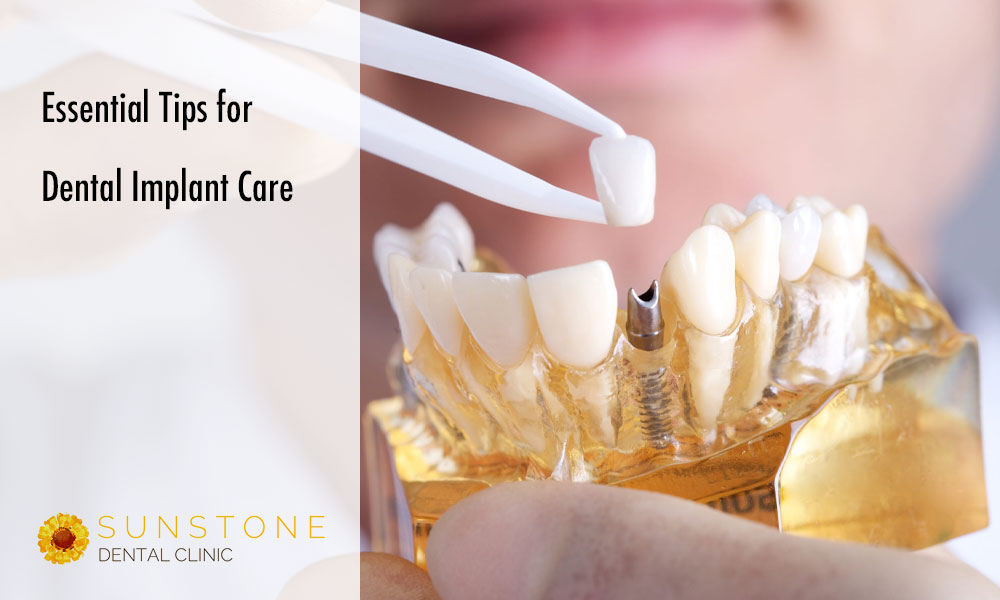Essential Tips for Dental Implant Care

Proper care is essential to keep your dental implants healthy and long-lasting. Many people are unsure about the best practices, but following these simple tips will help protect your implants and maintain a radiant smile. Don’t let poor care affect their success—let’s explore the key steps to keep your implants in top shape.
Why Proper Care is Important for Dental Implants
Caring for your dental implants is vital for your oral health and overall well-being. Here’s why:
- Lasting Longevity: With good hygiene, implants can last a lifetime; neglect can lead to infections, inflammation, or even failure.
- Daily Cleaning: Keeping your implants clean helps ensure they stay secure, enhancing your ability to chew and speak.
- Boost Confidence: A well-maintained smile boosts your self-esteem and confidence.
- Protect Your Investment: Prioritizing daily care safeguards your investment and maintains a healthy, functional smile for years to come.
The Basics of Dental Implant Care
The foundation of dental implant care begins with a solid oral hygiene routine. Like natural teeth, dental implants require regular cleaning to prevent plaque buildup and maintain gum health. Here’s how to care for your dental implants effectively:
- Use a soft-bristled toothbrush: Brush at least twice a day to protect the implant surface and focus on all areas, especially around the gumline.
- Choose non-abrasive toothpaste: Avoid scratching the implant by using toothpaste without harsh ingredients.
- Incorporate antibacterial mouthwash: Rinse regularly to reduce bacteria and lower the risk of infections.
- Add interdental brushes or water flossers: These tools help clean hard-to-reach areas around implants and between teeth.
Brushing Techniques
Brushing dental implants requires a gentle approach. Hold your toothbrush at a 45-degree angle to the gums and use circular motions to clean beneath the gumline while stimulating gum health. Brush for at least two minutes, covering all areas, including the chewing surfaces, inner teeth, and molars. Finish with an antibacterial mouthwash to reduce plaque and maintain a healthy environment around the implants. A consistent brushing routine ensures the longevity of your implants and supports overall oral health.
Flossing and Interdental Cleaning
Flossing is essential for maintaining implant health, but traditional floss may not be ideal. Opt for dental tape or specialized implant floss, which are thicker and better suited for cleaning around implants and gum tissue. Gently slide the floss between your teeth and curve it around the implant post to remove plaque, reaching beneath the gumline without causing irritation. Floss at least once a day to build a routine. For hard-to-reach areas, consider interdental brushes or soft picks to reduce the risk of gum disease and support the longevity of your implants.
Dietary Considerations
Your diet plays a key role in the health of your dental implants. During the healing phase, avoid hard, sticky, or crunchy foods like nuts and tough meats to prevent stress or damage to the implants. Stick to soft, nutrient-rich options such as yogurt, smoothies, and pureed vegetables. Once healed, maintain a balanced diet with calcium and vitamin D-rich foods like dairy, leafy greens, and fish to support bone health. Antioxidant-rich fruits and vegetables can reduce inflammation, while staying hydrated helps keep your mouth clean. Limiting sugary drinks and alcohol will further protect your implants and oral health.
Regular Dental Check-ups and Professional Cleanings
Even with good at-home care, regular dental check-ups are essential for keeping your implants healthy. Visit your dentist at least twice a year to check for issues like infections or gum disease that could affect the implants. Professional cleanings are also crucial, as hygienists use special tools to remove plaque and tartar without damaging the implant. If you notice any discomfort or changes, contact your dentist immediately to prevent complications. Routine dental visits play a key role in ensuring the long-term success of your implants.
Avoiding Habits That Can Damage Dental Implants
Certain habits can harm the health and longevity of your dental implants. Here are some to avoid:
- Smoking: This significantly increases the risk of implant failure by impairing blood flow to the gums, slowing healing, and promoting infection. If you’re a smoker, consider seeking support to quit for both your dental health and overall well-being.
- Using teeth as tools: Avoid biting on hard objects, opening packages, or chewing ice, as these can put excessive pressure on your implants and cause damage.
- Teeth grinding or clenching: These actions can stress the implant structure. If you suspect you grind your teeth, consult your dentist about possible solutions, such as a night guard.
- Excessive consumption of acidic or sugary foods: While implants themselves can’t decay, the surrounding gum and bone tissue can suffer. Being mindful of your dietary habits, combined with proper dental care, will help keep your implants healthy and functional for years to come.
Conclusion
Caring for your dental implants takes dedication and the right knowledge. This includes proper brushing and flossing, smart dietary choices, avoiding harmful habits, and scheduling regular dental check-ups. Combining consistent at-home care with professional cleanings helps prevent complications and ensures your implants stay healthy. With the right routine, you can protect your investment and enjoy a confident, radiant smile for years to come. To book an appointment, call Sunstone Dental Clinic at (604) 428-8722.
